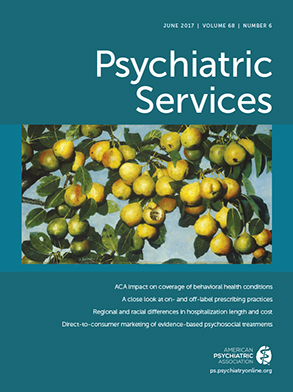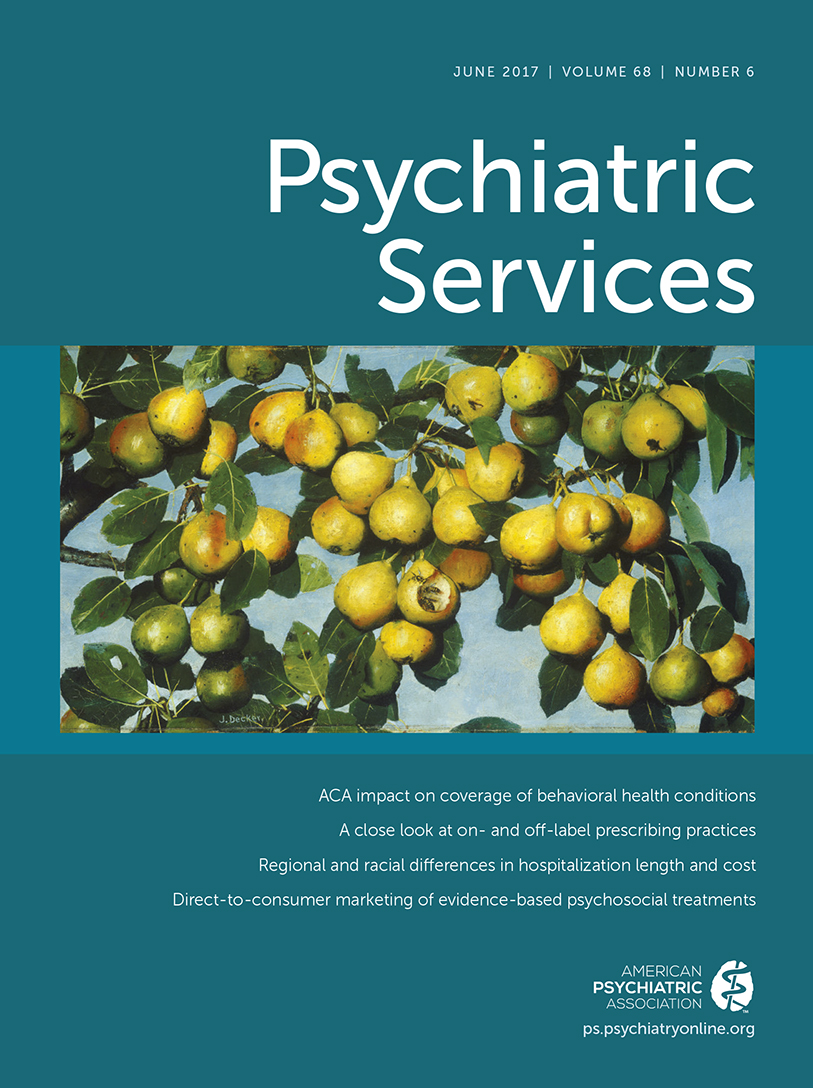Outpatient psychiatric care is a scarce valuable resource for people who develop serious psychiatric illnesses. In this Open Forum, we assert that the mental health system is not making optimal use of the time, skills, and energy of the psychiatric care providers (psychiatrists, psychiatric nurse practitioners, and psychiatric physician assistants) who offer this crucial service. This argument is informed by our multidisciplinary backgrounds in psychiatry (WCT), health behavior research (IG), and medical anthropology (EACS) and is grounded in an ongoing study, funded by the Patient-Centered Outcomes Research Institute, of psychiatric visit enhancement that includes qualitative interviews with psychiatric care providers and service users in community mental health centers.
“Medication Management”
Today, many outpatient psychiatric care providers are employed to provide “medication management” in brief 15- to 20-minute visits. In qualitative interviews, patients and psychiatric care providers alike expressed that psychiatric care has been narrowed to the act of prescribing medications. Indeed, this is reflected in the terminology respondents used for standard psychiatric care: “med management,” “med clinics,” and “psychopharmacology clinics.” During typical visits, many psychiatric care providers reported that they focus their efforts on assessing symptoms, the impact of medications on symptoms, and side effects of medications: “My goal is to make them symptom free.” Some psychiatric care providers clearly distinguished their medication-focused work from psychotherapeutic work, which was viewed as the province of other clinicians. A psychiatrist described challenges that ensue when patients are not oriented to this difference:
Oftentimes, patients don’t understand what the difference is between a medication check and a therapy visit. . . . Sometimes it’s very hard for them to distinguish, “Are we talking about what’s going on with my life, or are we only talking about medication?” Sometimes I feel like they leave with a sense that they have not been heard because I’ve had to refocus them back to, “We need to talk about medications.”
Although many psychiatric care providers recognized the limitations of not engaging more fully with contextual aspects of patients’ lives, serious time constraints coupled with productivity pressures have made well-intentioned psychiatric care providers reluctant to ask more in-depth questions:
Unless I have a lot of time I try not to be too open-ended in terms of “how are you, how’s it going” type stuff, but I try to keep it fairly focused in terms of how they're doing with their symptoms, how they're doing with the meds. Do they have any side effects? Are they compliant?
Patients spoke of the lack of depth in their conversations with psychiatric care providers and contrasted these interactions with more substantive relationships: “I mostly . . . talk to the therapist. I don’t really talk to the doctor.” Patients also expressed frustration at feeling rushed in psychiatric appointments: “It’s like going through a McDonald’s drive-thru. You drive through the window, they give you your prescriptions, and you’re on your way.”
The Problem
The main problem with brief psychiatric visits is that they are not well designed to achieve their core purpose: to promote the health and life of the person seeking professional help. Frustration with the care process leaves both the patient and the psychiatric care provider deeply dissatisfied. Why is this so? Unless the psychiatric care provider knows the patient well and the situation is unusually simple, 15 to 20 minutes is just not enough time to engage the patient, gather relevant data, make an assessment, come to an informed, shared decision about next steps, set the plan in motion, and fulfill the tasks required to document effective care.
The structure of the “med check” format pushes psychiatric care providers to narrow their therapeutic focus to medications. Psychiatric difficulties are usually complicated, and psychiatric care providers are trained to assess contributing biological, social, and psychological dimensions and to formulate potential solutions that take this complexity into account. Given that medications have side effects and limits to what they can accomplish, the plan that has the best chance of supporting a patient’s life might involve
doing something—such as getting a safer apartment, learning self-care strategies, or engaging in supported employment—rather than
taking something. But the term “medication management clinic” and the way such a clinic’s workflow is designed result in an expected default solution of using a medication. For example, in a fast moving “psychopharmacology clinic,” the psychiatric care provider and patient are both likely to reach for a medication to address insomnia rather than facilitate referral for cognitive-behavioral therapy for insomnia, a treatment with strong research support (
1). For mindset and workflow convenience, “med clinics” can easily draw psychiatric care providers and patients into overprescribing as they look primarily to medications to fix problems rather than choosing nonmedication actions that could improve health.
In addition, therapeutic decisions are only as good as the information on which they are based. To prescribe well, psychiatric care providers need to know their patients as people and hear from them what they hope to achieve with medications. They also need to know about current symptoms and side effects and how they compare with the patient’s experience of symptoms and side effects at earlier points in time. Collecting all this information (especially if it is done in a standardized format that can be tracked over time) is very difficult for the psychiatric care provider to elicit within a 15- to 20-minute visit.
Finally, prescribing a medication will not have its desired health impact if the patient does not take it. Understandably, patients are unlikely to follow a psychiatrist’s recommendations unless they have the sense that the physician knows them well and cares about their well-being. The brief “med check” format leaves little time for the healing work of connecting humanely, communicating understanding, admiring strengths, promoting hope, and building the patients’ motivation and capacity to take an active role in their self-care, all of which help establish a trusting connection.
How Did Outpatient Psychiatric Care Get This Way?
A number of societal forces have led to using the psychiatric provider workforce in this manner. These include an increase in number of people using mental health services (
2), the therapeutic importance of medications (
3), a shortage of psychiatric care providers (
4), a decline in funding for outpatient care (
5), the profession’s desire for the prestige of being seen to practice “like other doctors,” fee-for-service payment models that reward filling up available time with brief visits, and the acquiescence to current practice patterns seen in the decreased emphasis on psychological and social factors in training curricula. The pharmacology industry is also invested in promoting medication solutions to psychiatric challenges, and their advertising has an impact on psychiatric care providers and service users (
6).
What to Do?
The powerful societal pressures are not likely to change quickly. But the field of psychiatry can make psychiatric visits more therapeutic by reframing and redesigning the work. The aim is to improve care for patients and, in the process, make outpatient psychiatric practice more professionally satisfying for psychiatric care providers.
Changing the language of psychiatric care.
Language matters because it frames everyone’s conception of an activity and sets the stage for what happens. The names “medication clinic” and “psychopharmacology clinic” came about to distinguish these clinics from the practice of pure psychiatric psychotherapy, a distinction that is no longer needed. The core problem with the name “medication clinic” is that it places the emphasis on medications when the emphasis should be on care. The work of outpatient psychiatric care providers is to engage, evaluate, formulate, educate, and partner with the service user to design and act on a plan of psychosocial, educational, and somatic interventions to support recovery (
7). The clinical encounter is an active human process that often includes but is not limited to prescribing medications.
We recommend using the term “psychiatric care” to describe the function, “psychiatric care clinic” to describe the work activity, and “psychiatric care provider” (rather than the reductionist term “prescriber”) to describe psychiatrists, psychiatric nurse practitioners, and psychiatric physician assistants together. These terms parallel “primary care,” “primary care clinic,” and “primary care provider.” Calling the work “psychiatric care” emphasizes the act of caring. The term also respects the complexity and humanity of the work. Psychiatric care (like primary care) does not equal prescribing even when it includes prescribing.
Redesigning the workflows of psychiatric care visits.
In addition, to leverage the skills and energy of a limited psychiatric workforce, psychiatric professionals must redesign the workflow of the psychiatric care visit to enhance its health-promoting capacity. The redesigned visit might look more like a smooth-running primary care office where history taking, basic assessment, and measurements of vital signs are gathered before the physician enters the room and where designated team members are prepared to put the treatment plan into action at the end of the visit. For example, core required data (the patient’s aim for the visit, symptom ratings, side effect concerns, and use of medication and other substances) can be collected by a trained psychiatric medical assistant or a good computer program. Common clinical scenarios can be anticipated, allowing psychiatric care clinicians to design effective and efficient clinical pathways—organized packages of screening, measurement, education, and therapeutic intervention (including but not limited to medications) that can be ordered with the check of a box when indicated. Pathway development organizes the work before the patient enters the room so that time-constrained psychiatric care providers can efficiently acquire needed assessment information and initiate complex, thoughtful plans that meet patient needs. With well-designed workflows, psychiatric care providers can use their limited time for the essential health-promoting work: connecting therapeutically, integrating patient-specific aggregated data with what is known from the scientific literature, and partnering with each patient to develop a practical shared bio-psycho-social plan.
Designing more efficient, effective, recovery-promoting care requires the expertise of systems engineers, people with the lived experience of mental illness, experienced psychiatric care providers, computer programmers, educational experts, and others all working together as a team. New workflows that do not make the care better for patients and easier for psychiatric care providers will not be implemented and used in routine practice. This future workflow redesign will build off past and current efforts to use measurement in standard care (
8,
9) and to make the care process more recovery oriented (
10).

